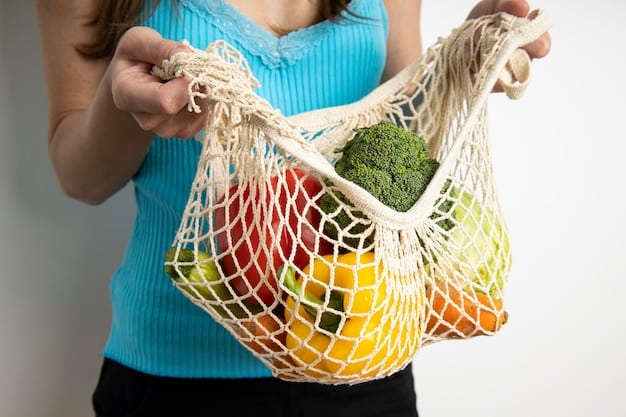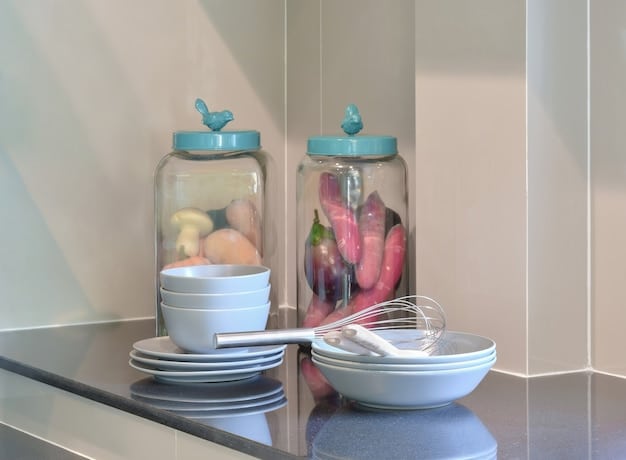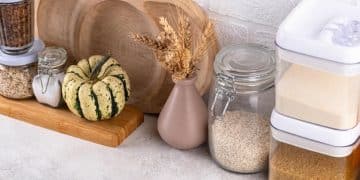How to Reduce Plastic Waste: Practical Tips for a Plastic-Free Lifestyle

Reducing plastic waste involves simple lifestyle changes like using reusable bags and bottles, avoiding single-use plastics, and supporting businesses committed to sustainability, contributing to a healthier planet.
Are you concerned about the overwhelming amount of plastic polluting our planet? Learning how to reduce plastic waste: practical tips for a plastic-free lifestyle is both essential and achievable with simple, conscious changes.
Understanding the Plastic Problem
Plastic pollution is one of the most pressing environmental issues of our time. Its pervasive presence impacts ecosystems, wildlife, and even human health. Understanding the scope of the problem is the first step towards making meaningful change.
The Environmental Impact of Plastic
Plastics take hundreds of years to degrade, polluting oceans and land. Microplastics, tiny plastic particles, contaminate water sources and enter the food chain.
Health Risks Associated with Plastic
Chemicals in plastics can leach into food and water, potentially disrupting hormones and causing other health problems. Single-use plastics, often used for food and beverages, pose a particular risk.
- Plastic takes centuries to decompose, accumulating in landfills and natural environments.
- Marine life suffers as animals ingest plastic, leading to starvation and entanglement.
- Microplastics have been found in drinking water and seafood, raising concerns about human consumption.
By grasping the magnitude of the issue, individuals can feel more motivated to take action. Each small step contributes to a larger movement towards a more sustainable future. Reducing plastic consumption isn’t just a trend; it’s a necessity.
Easy Swaps for a Plastic-Free Kitchen
The kitchen is often a hotspot for plastic consumption, but it’s also an area where simple swaps can make a big difference. By making conscious choices in our food storage, preparation, and cleaning routines, we can drastically reduce our plastic footprint.
Reusable Food Storage
Ditch plastic wrap and bags for reusable containers, beeswax wraps, and silicone lids. These alternatives are not only eco-friendly but also keep your food fresh.
Eco-Friendly Cleaning Products
Opt for dish soap and cleaning solutions that come in biodegradable packaging or can be refilled. Consider making your own cleaning solutions using natural ingredients.

- Glass Containers: Durable and safe for storing leftovers and meal prepping.
- Beeswax Wraps: Perfect for wrapping fruits, vegetables, and sandwiches.
- Silicone Bags: Ideal for freezing food and packing snacks.
The kitchen provides numerous opportunities for reducing plastic waste. By embracing reusable alternatives and eco-friendly products, you contribute to a healthier environment and reduce your dependence on single-use plastics. Every small change adds up to a significant impact.
Plastic-Free Shopping Habits
Our shopping habits play a crucial role in the amount of plastic we consume. By making informed decisions and planning ahead, we can minimize the plastic we bring home from the store.
Bring Your Own Bags
Always carry reusable shopping bags with you. Keep them in your car, purse, or backpack, so you’re always prepared. Opt for cloth bags, which are sturdier and more sustainable than plastic bags.
Buy in Bulk
Purchase items like grains, nuts, and seeds from bulk bins using your own reusable containers. This reduces packaging waste and often saves money.
- Reusable Produce Bags: Use mesh or cloth bags instead of plastic ones for fruits and vegetables.
- Support Local Farmers Markets: Purchase directly from farmers who often use less packaging and avoid plastic altogether.
- Refuse Excess Packaging: Politely decline unnecessary plastic wrapping or containers when purchasing items.
Transforming shopping habits into sustainable practices requires awareness and commitment. By choosing reusable options and supporting businesses that prioritize eco-friendly packaging, you actively contribute to reducing plastic waste. Each conscious choice makes a difference.
DIY Personal Care Products
Many personal care products come in plastic packaging, but making your own is a fun and eco-friendly alternative. DIY personal care products are not only better for the environment but also allow you to control the ingredients you use.
Homemade Shampoo and Conditioner
Create your own shampoo and conditioner using natural ingredients like essential oils, castile soap, and apple cider vinegar. Store them in reusable glass bottles.
DIY Deodorant
Make your own deodorant using a combination of baking soda, coconut oil, and essential oils. This simple recipe eliminates the need for store-bought plastic containers.

- Reusable Containers: Use glass jars and bottles for storing your homemade products.
- Natural Ingredients: Opt for organic and sustainably sourced ingredients.
- Reduce Chemical Exposure: Homemade products are free from harmful chemicals often found in commercial brands.
Crafting your own personal care products offers a rewarding way to reduce plastic waste and enhance your well-being. By embracing simple recipes and natural ingredients, you can minimize your environmental impact and take control of your personal care routine. Each homemade product represents a step towards a more sustainable lifestyle.
Reducing Plastic Waste on the Go
Living a plastic-free lifestyle isn’t confined to our homes; it’s equally important to reduce plastic waste when we’re on the go. By planning ahead and making smart choices, we can significantly minimize our reliance on single-use plastics when we’re out and about.
Carry a Reusable Water Bottle
Invest in a durable, reusable water bottle and refill it throughout the day. Avoid purchasing bottled water whenever possible.
Pack Your Own Lunch and Snacks
Bring your own lunch and snacks in reusable containers. This eliminates the need for pre-packaged meals and snacks that often come in plastic packaging.
- Reusable Coffee Cup: Bring your own coffee cup to your favorite coffee shop and ask them to fill it instead of using a disposable cup.
- Say No to Straws: Politely decline plastic straws when ordering drinks. Consider carrying your own reusable straw.
- Reusable Utensils: Keep a set of reusable utensils in your bag for meals on the go.
Reducing plastic waste on the go requires a proactive approach and mindful choices. By carrying reusable essentials and resisting the convenience of single-use plastics, you contribute to a cleaner environment and promote sustainable practices wherever you go. Every prepared choice makes a difference.
Advocating for Change and Supporting Sustainable Businesses
Individual actions are powerful, but advocating for change and supporting sustainable businesses amplifies our impact. By engaging with our communities and supporting companies committed to reducing plastic waste, we can drive larger systemic changes.
Support Businesses with Sustainable Practices
Choose products from companies that prioritize eco-friendly packaging and sustainable manufacturing processes. Look for certifications like the B Corp and Cradle to Cradle.
Advocate for Policy Changes
Support policies that reduce plastic consumption, such as bans on single-use plastics and incentives for reusable alternatives. Contact your local representatives to voice your concerns.
- Participate in Community Cleanups: Join local cleanup efforts to remove plastic litter from your community.
- Educate Others: Share your knowledge and inspire others to adopt sustainable practices.
- Vote with Your Wallet: Support businesses that prioritize sustainability and ethical practices.
Advocating for change and supporting sustainable businesses creates a ripple effect that extends beyond individual actions. By uniting with like-minded individuals and organizations, we can collectively push for a more sustainable future and significantly reduce plastic waste on a global scale. Every voice and every action contributes to meaningful change.
| Key Point | Brief Description |
|---|---|
| ♻️Reusable Bags | Use cloth bags instead of plastic ones for shopping. |
| 🍲 Food Storage | Opt for glass containers over plastic wrap for leftovers. |
| 🧴 DIY Products | Make homemade shampoo and deodorant to avoid plastic packaging. |
| 🥤 Skip Straws | Politely decline plastic straws; carry reusable ones. |
Frequently Asked Questions
▼
Reducing plastic waste is crucial because plastics pollute ecosystems, harm wildlife, and can take hundreds of years to decompose. Minimizing plastic use protects our planet and its inhabitants.
▼
Easy ways to reduce plastic use at home include using reusable shopping bags, opting for glass or metal food containers, and buying products with minimal packaging. These small changes add up.
▼
When shopping, bring reusable bags, buy in bulk using your own containers, and choose products with less plastic packaging. Support local farmers markets to avoid packaged goods.
▼
Yes, alternatives to plastic kitchenware include glass, stainless steel, bamboo, and silicone. These materials are durable, reusable, and safer for both your health and the environment.
▼
Encourage others by sharing your knowledge, leading by example, and participating in community cleanups. Educate friends and family about the importance of reducing plastic consumption.
Conclusion
Reducing plastic waste is an essential step towards creating a sustainable future. By implementing these practical tips into our daily lives, advocating for change, and supporting sustainable businesses, we can collectively make a significant impact on reducing plastic pollution and safeguarding the planet for future generations.





